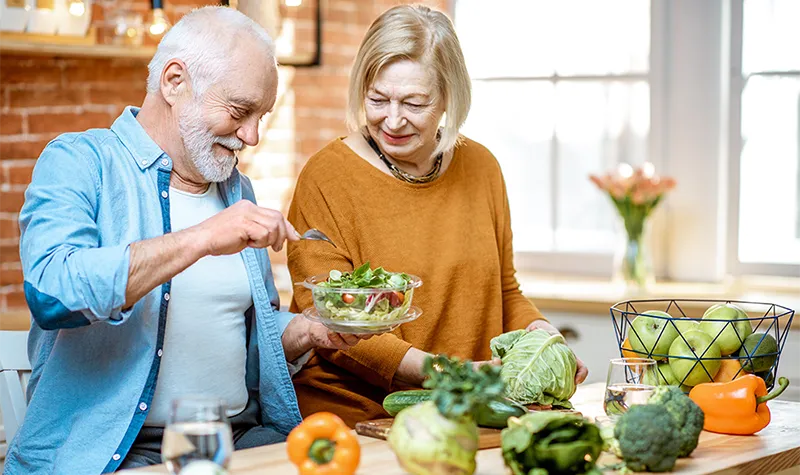As we age, maintaining proper nutrition can feel overwhelming. Our bodies change, and so do our nutritional needs. At Charter House, we understand the challenges of knowing what nutrients to focus on. For many seniors and their families, ensuring a balanced, nutritious diet that supports overall well-being becomes a top priority. This blog offers guidance on healthy nutrition for seniors, helping you understand what your body needs as you age and providing practical tips for maintaining a healthy diet.
Understanding Healthy Nutrition for Seniors
As we age, our bodies require different nutrients to maintain optimal health, making it important to focus on the right foods. Ensuring healthy nutrition for seniors involves incorporating essential nutrients that support muscle strength, bone health, and cognitive function.
- Protein is crucial for preserving muscle mass, which naturally declines with age.
- Calcium and Vitamin D work together to keep bones strong and reduce the risk of osteoporosis.
- Fiber promotes healthy digestion, lowers cholesterol, and helps regulate blood sugar levels.
- Potassium is important for maintaining healthy blood pressure and supporting heart function.
- Vitamin B12 plays a key role in cognitive health, but absorption of this vitamin becomes more difficult as we age.
In addition to focusing on nutrient-rich foods, it’s essential for seniors to stay hydrated. Dehydration is a common issue, and maintaining regular fluid intake can help prevent related health problems.
For some, supplements may be necessary to meet daily requirements, particularly for calcium, vitamin D, and B12. However, it’s always best to consult with a healthcare provider before adding supplements to your routine.
Addressing Appetite Changes in Seniors
As we age, many people experience changes in appetite, which can make maintaining a healthy diet challenging. However, with a few adjustments, it’s possible to ensure healthy nutrition for seniors even when appetite decreases. Offering smaller, nutrient-dense meals throughout the day can help seniors get the necessary nutrients without feeling overwhelmed by large portions. Additionally, eating in a social setting can improve both appetite and overall eating habits. Dining with others often makes meals more enjoyable and provides motivation to stick to a nutritious routine.

Staying Active: Nutrition and Exercise
Nutrition and physical activity are interconnected. For seniors, staying active helps maintain strength, balance, and independence. A diet rich in protein is essential to support muscle recovery and strength, while regular movement helps maintain energy levels. Even light exercise, like walking, paired with proper nutrition, can have significant benefits. Whether it’s gentle stretching or participating in a fitness class, exercise should be supported with the right nutrients to ensure seniors remain mobile and active.
Tips for Healthy Eating Habits
Healthy eating doesn’t have to be complicated. Focus on whole grains, lean proteins, fruits, and vegetables to create nutritious meals. Planning meals ahead of time can make it easier to stay on track with a balanced diet. For seniors with dental concerns, opt for easy-to-chew options like soft vegetables, scrambled eggs, and smoothies to ensure a variety of nutrients are still being consumed.

Live a Healthy Life at Charter House
At Charter House, we believe that healthy nutrition for seniors is vital for aging well. We offer a range of culinary options to meet individual needs, whether residents enjoy meals prepared by our chefs or prefer cooking in their own kitchens. Our community is designed to support healthy, independent living through nutritious dining and social engagement. Contact us today to learn how the Charter House community can help you or your loved one achieve a healthy lifestyle!